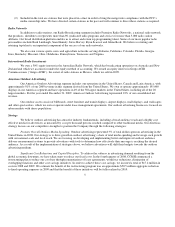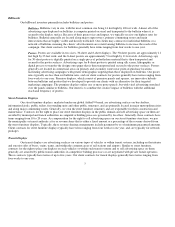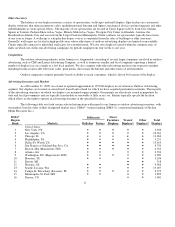iHeartMedia 2009 Annual Report Download - page 18
Download and view the complete annual report
Please find page 18 of the 2009 iHeartMedia annual report below. You can navigate through the pages in the report by either clicking on the pages listed below, or by using the keyword search tool below to find specific information within the annual report.
Irrespective of the FCC’s radio ownership rules, the Antitrust Division of the DOJ and the FTC have the authority to
determine that a particular transaction presents antitrust concerns. In particular, where the proposed purchaser already owns one or
more radio stations in a particular market and seeks to acquire additional radio stations in that market the DOJ has, in some cases,
obtained consent decrees requiring radio station divestitures.
The current FCC ownership rules relevant to our business are summarized below.
Local Radio Ownership Rule: The maximum allowable number of radio stations that may be commonly owned in a
market ranges based on the size of the market. In the largest radio markets, defined as those with 45 or more stations, one
entity may have an attributable interest in up to 8 stations, not more than 5 of which are in the same service (AM or FM).
At the other end of the scale, in radio markets with 14 or fewer stations, one entity may have an attributable interest in up
to 5 stations, of which no more than 3 are in the same service, so long as the entity does not have an interest in more than
50% of all stations in the market. To apply these ownership tiers, the FCC relies on Arbitron Metro Survey Areas, where
they exist, and a signal contour-overlap methodology where they do not exist. An FCC rulemaking is pending to determine
how to define radio markets for stations located outside Arbitron Metro Survey Areas.
Newspaper-Broadcast Cross-Ownership Rule: FCC rules generally prohibit an individual or entity from having an
attributable interest in a radio or television station and a daily newspaper located in the same market. In 2007, the FCC
adopted a revised rule that would allow same-market newspaper/broadcast cross-ownership in certain limited
circumstances. This rule is subject to a petition for reconsideration at the FCC and a pending judicial appeal.
Radio-Television Cross-Ownership Rule: FCC rules permit the common ownership of 1 television and up to 7 same-
market radio stations, or up to 2 television and 6 same-market radio stations, depending on the number of independent
media voices in the market and on whether the television and radio components of the combination comply with the
television and radio ownership limits, respectively.
Alien Ownership Restrictions: The Communications Act restricts foreign entities or individuals from owning or voting
more than 20% of the capital stock of a corporate licensee. Additionally, a broadcast license may not be held by any entity that is
controlled, directly or indirectly, by a business entity more than one-fourth of whose capital stock is owned or voted by a foreign
entity or individual. Since we serve as a holding company for FCC licensee subsidiaries, we are effectively restricted from having
more than one-fourth of our stock owned or voted directly or indirectly by a foreign entity or individual.
Indecency Regulation: Federal law regulates the broadcast of obscene, indecent, or profane material. Legislation enacted
by Congress provides the FCC with authority to impose fines of up to $325,000 per utterance with a cap of $3.0 million for any
violation arising from a single act. Broadcasters risks violating the prohibition against airing indecent or profane material because of
the FCC’s broad and vague definition of such material; coupled with the spontaneity of live programming. Several judicial appeals of
FCC indecency enforcement actions are currently pending, and their outcomes could affect future FCC policies in this area. Also, we
have received, and may receive in the future, letters of inquiry and other notifications from the FCC concerning pending complaints
alleging that programming aired on our stations contains indecent or profane language.
Equal Employment Opportunity. The FCC’s rules require broadcasters to engage in broad recruitment efforts, keep a
considerable amount of recruitment data, and report much of this data to the FCC and to the public via stations’ public files and
websites. Broadcasters are subject to random audits regarding rules compliance, and could be sanctioned for noncompliance.
Digital Radio. The FCC has established rules for the provision of digital radio broadcasting, and has allowed radio
broadcasters to convert to a hybrid mode of digital/analog operation on their existing frequencies. Recently, the FCC approved an
increase in the maximum allowable power for digital operations, which will improve the geographic coverage of digital signals. It is
still considering whether to place limitations on subscription services offered by digital radio broadcasters or whether to apply new
public interest requirements to this service. We have commenced digital broadcasts on 497 of our stations, and cannot predict the
impact of this service on our business.
Other. Congress and the FCC may in the future adopt new laws, regulations and policies that could affect, directly or
indirectly, the operation, profitability, and ownership of our broadcast stations. In addition to the regulations noted above, such
matters include, for example: proposals to impose spectrum use or other fees on FCC licensees; legislation that would provide for the
payment of performance royalties to artists and musicians whose music is played on our stations; changes to the political broadcasting
rules, including the adoption of proposals to provide free air time to candidates; restrictions on the advertising of certain products
15
























